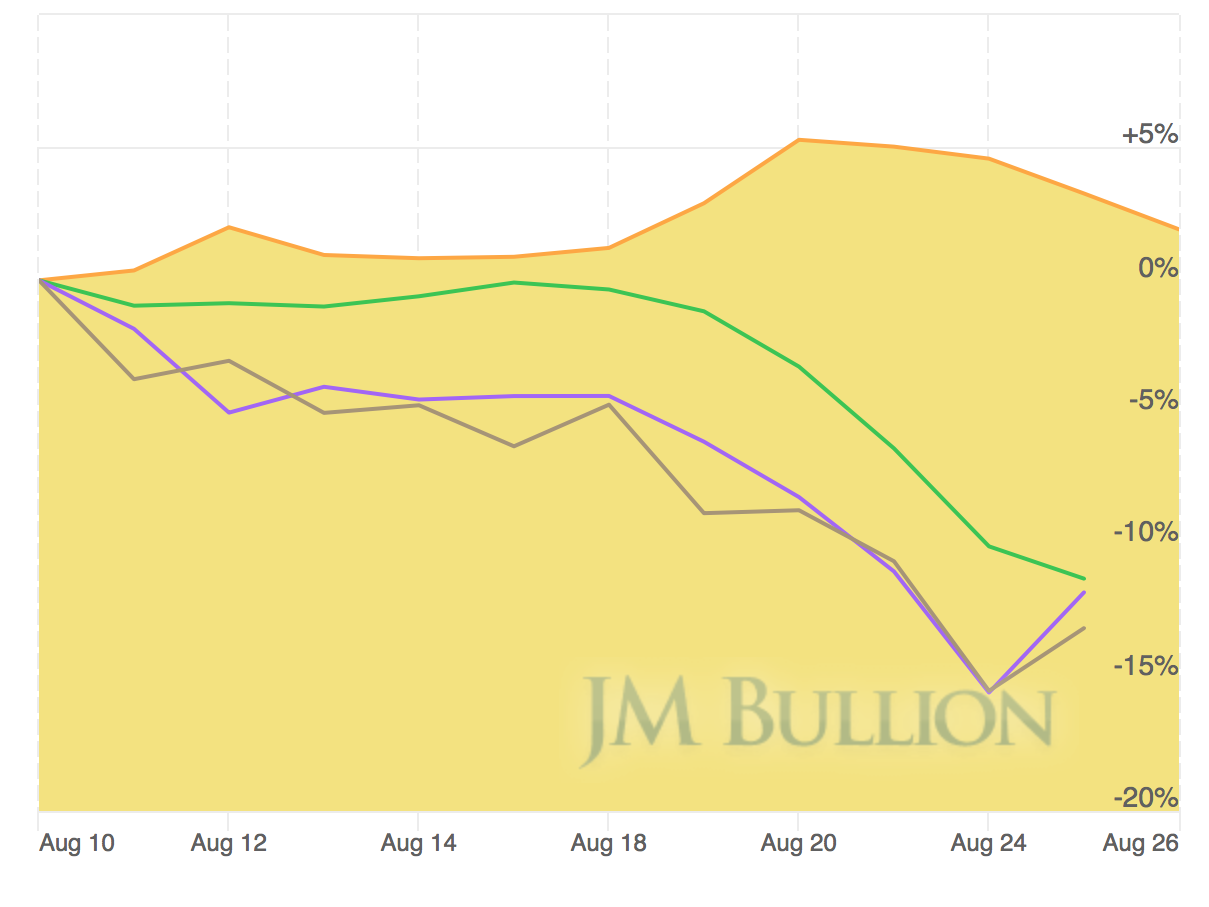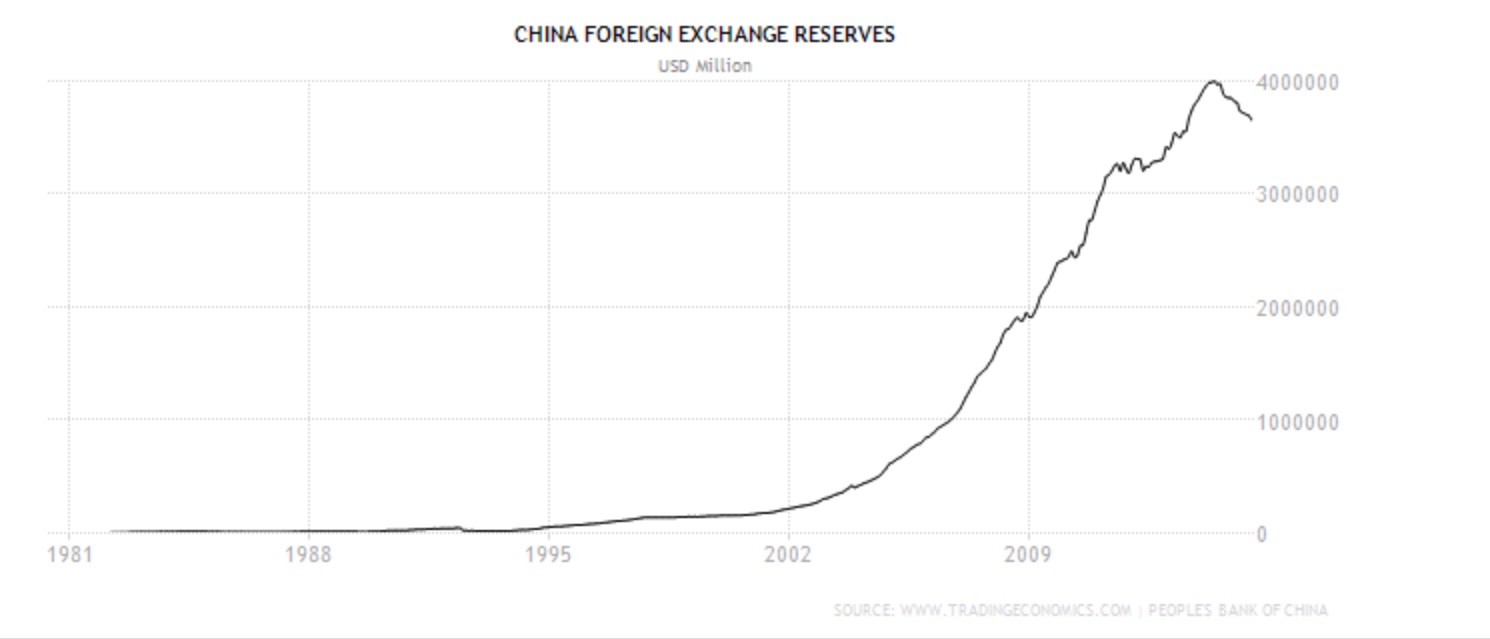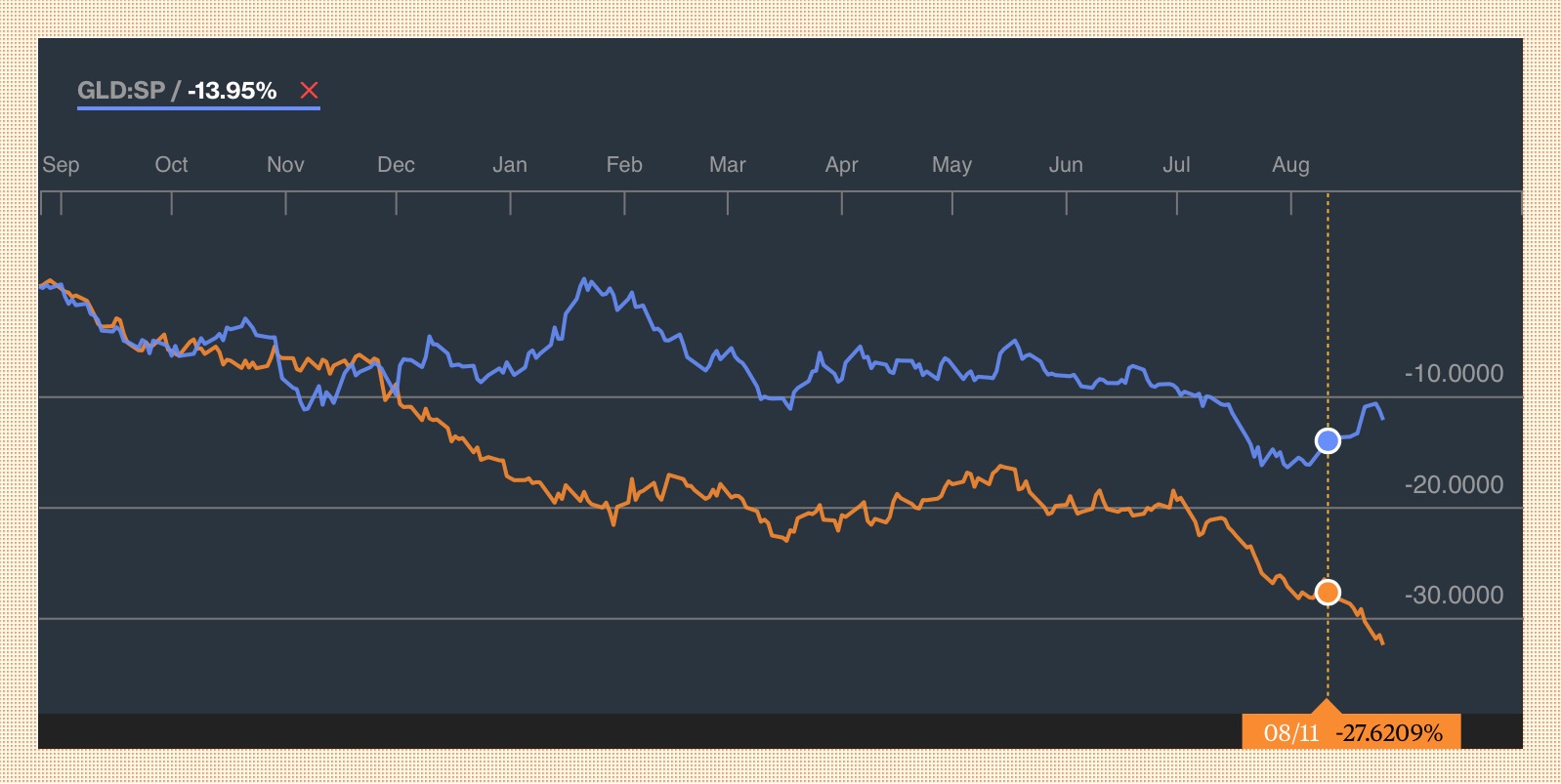Gold Resilient After China Incites Chaos in Fiat Currency Markets

Global currency, equity and commodity markets are in turmoil following China’s abrupt devaluation of the yuan earlier this month. In Africa, Latin America and Asia, currencies are rapidly losing value against the U.S. dollar. Colombia and Brazil have seen their currencies fall 25%, Mexican Pesos are down 12%, Malaysia’s Ringgits are 16% cheaper, and the South African Rand fell over 10%, to name just a few. Equity and commodity markets around the world have also suffered double digit declines and dramatic swings since China’s pivotal move. As the dust settles, volatility and uncertainty run high.
Despite these stormy seas and global economic upheaval, the price of gold has not moved significantly, at least not yet. Gold is usually an investor haven in times of turbulence. Although its price can be slow to react. According to Reuters, as a broad rule, bullion tends to benefit from stock market weakness as an alternative asset, but previous equity crashes show the initial price response can be to fall. In fact, in 2008 after Lehman Brother’s infamous collapse, the price of gold declined for two weeks before rallying for nearly three years.
The chart below shows gold (orange) inching up about 2% in the weeks following China’s move. Over the same period, stocks in the U.S. and Europe (green and purple respectively) were down over 10%. Crude oil (brown) was down over 15% at one point.
China Wants to Alter the International Monetary System
China’s yuan, which has been loosely pegged, un-pegged and re-pegged to the U.S. dollar over the past decade, is now considered a ‘managed floating currency,’ whereby the People’s Bank of China sets the exchange rate for the day and it trades within a small range (plus or minus 2%) of this rate. The following day, the rate is strategically re-set up or down according to government policy, which is not necessarily the same direction market forces would dictate. This manipulation of the exchange rate is know as the ‘daily fixing.’
In the past, China has been accused of maintaining an artificially low currency. A cheap yuan helped fuel global demand for Chinese exports, which translated into year after year of booming GDP growth. As a result, demand for yuans outpaced China’s demand for foreign currencies but the yuan was not allowed to appreciate. Thus, the PBOC had to balance the foreign exchange markets to maintain control of their currency’s value. In doing so, China’s central bank built the world’s largest store of foreign exchange reserves.
These reserves, controlled by the PBOC, consist of gold and foreign currencies as well as foreign currency denominated securities (treasury bills, government bonds, corporate bonds, equities and loans).
China’s hope is to diversify its reserves away from U.S. dollars, of which they own over one trillion. What they ultimately want is to see a shift in the global monetary system away from U.S. dollar reserves and for the yuan to become a global currency. They want their currency to be included in the IMF’s basket of reserve currencies. For this to happen, it must float freely, rather than being controlled by governement policy. China demonstrated an intent to move towards a freely traded currency by initiating a new policy at the same time as their currency devaluation. Going forward, the ‘daily fixing’ of the exchange rate will be based on the direction of the market on the previous day.
In July, China announced a 60% increase in their gold reserves since 2009. Disclosing 1658 tons of gold on July 17th and another 19 tons a month later. Many think China is actually hoarding much more gold. The country has become the world’s largest consumer of the yellow metal (although they do not often disclose official data). China’s government also strongly encourages its citizens to save gold not yuan in order to survive the inevitable global fiat devaluation rodeo.
Why China’s Currency Devaluation Incited A Global Economic Storm
When China shocked global markets by ‘fixing’ their exchange rate significantly below expectations on August 11th, global markets took it as a sign that China’s economy, the second largest in the world, might be in worse shape than was assumed. Devaluing the yuan helps bolster demand for China’s slowing exports, which posted an 8% annual decline in July.
China’s once insatiable appetite bolstered growth in commodity prices and production capacity worldwide. Commodities prices were already falling prior to China’s devaluation, which only sent them into a steeper decline. The graph below shows the Bloomberg commodity index and the price of Gold over the past year.
Commodity based economies, especially emerging market economies, are highly dependent on demand from China. Combined this with a global over-supply of crude oil and commodity markets are looking for new footing. Adding to the problem, these exporting countries will be pressured to devalue their currencies to remain competitive with China. Australia, Korea, Vietnam and India have all lowered lowered interest rates to devalue their currencies. Kazakstan unpegged its currency and other’s are expect to follow.
Throughout the global storms, the U.S. domestic economy continues to strengthen. Although inflation remains lacklustre and imports will inevitably get cheaper. This comes at a time when the Federal Reserve is hoping to start raising interest rates. The world is waiting anxiously for their decision as higher U.S. rates would strengthen the U.S. dollar and further cripple emerging market currencies.
Gold to Weather the Storm
Gold has been described as a bet against central banks. As the dust settles, there will be major shifts in the global economic landscape. Stories about market volatility dominate the headlines as central banks around the world announce policy changes to keep their economies afloat. If the market drama of the past few weeks has left you wondering where your money might be safe or doubting the ability of central banks to keep markets under control, you are not alone. Prior to China’s announcement, gold was down nearly 14% over the last year. Despite a small rally, it is still down year-over-year and appears hesitant to price in the current crisis. Markets are hard to time. So, if you don’t trust the central banks of the world to smoothly restore balance in the global economy, make a bet against them. Like the Chinese government recommends, buy gold to protect your wealth.

Will Your Retirement Weather the Next Financial Crisis?
Gold has been used as an inflation hedge and a way to preserve wealth for millennia. We partnered with Silver Gold Bull, Canada's top-rated gold company (with over 280,000 five-star reviews), to offer Canadians a low-cost and tax-advantaged way to buy gold and silver through an RRSP/TFSA or another retirement plan.
Request More Info
Website: www.SilverGoldBull.ca
Speak to an Expert: (877) 707-4707
Copyright 2023 Gold RRSP - Helping Canadians invest in physical bullion for retirement




